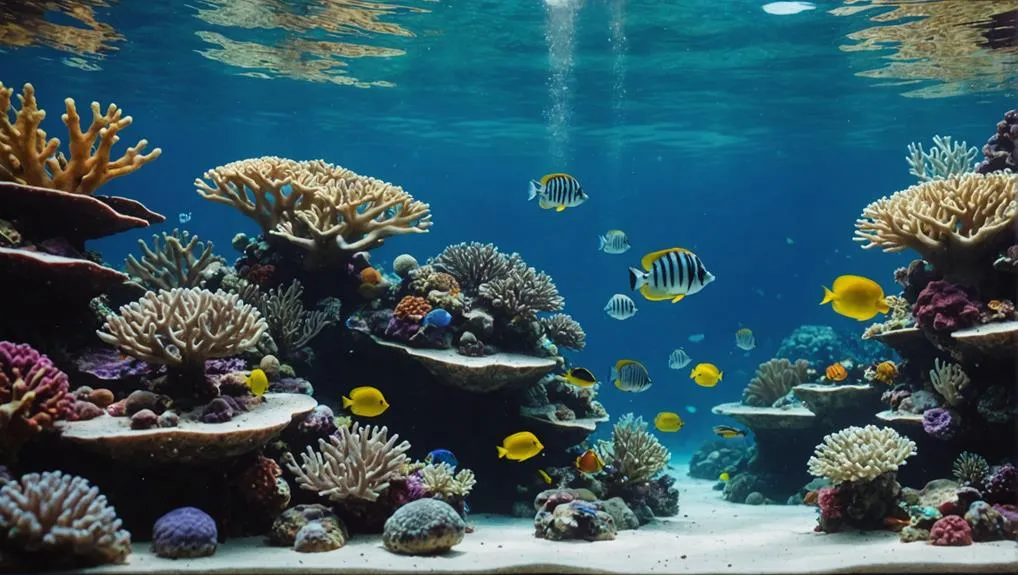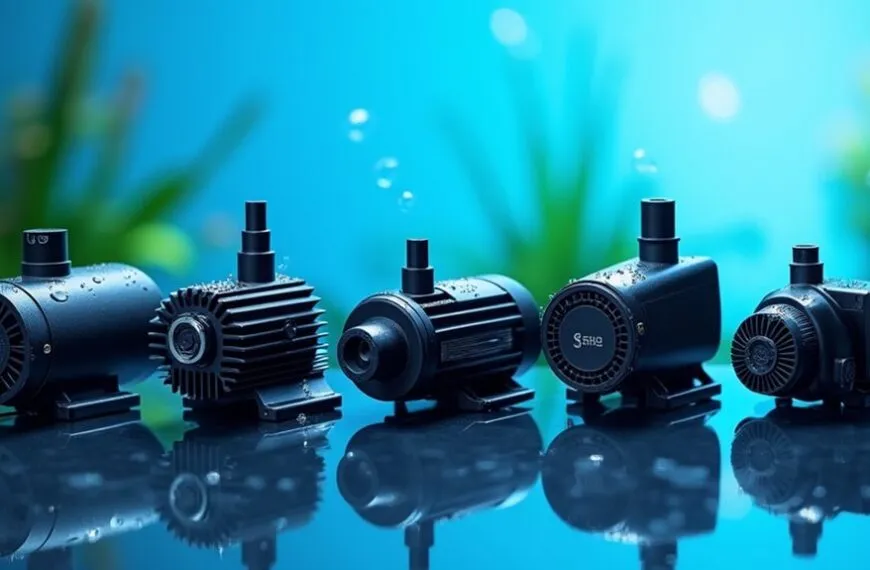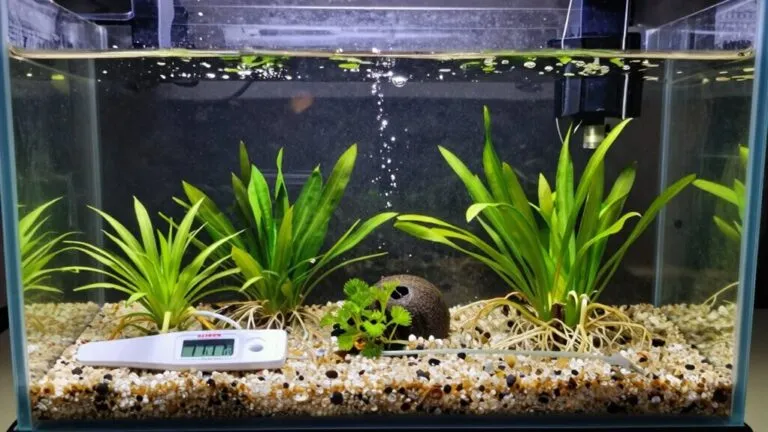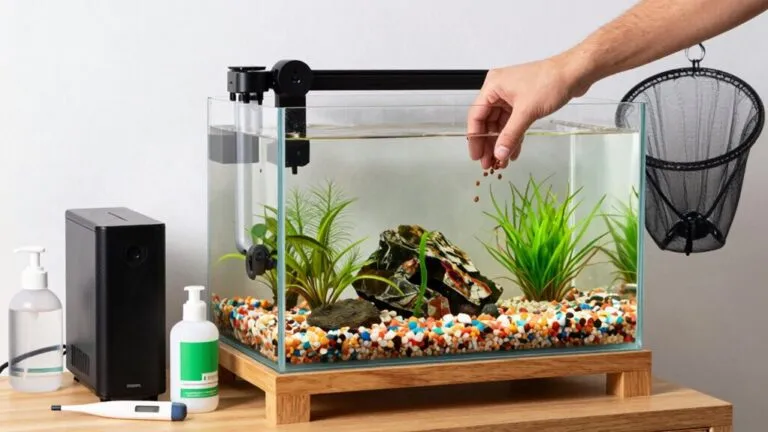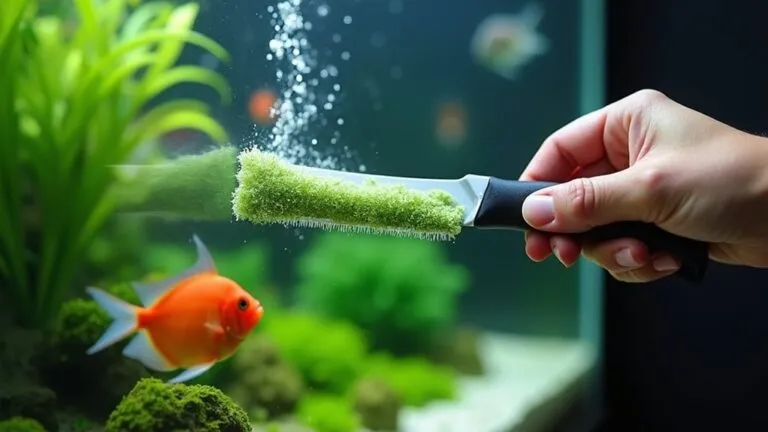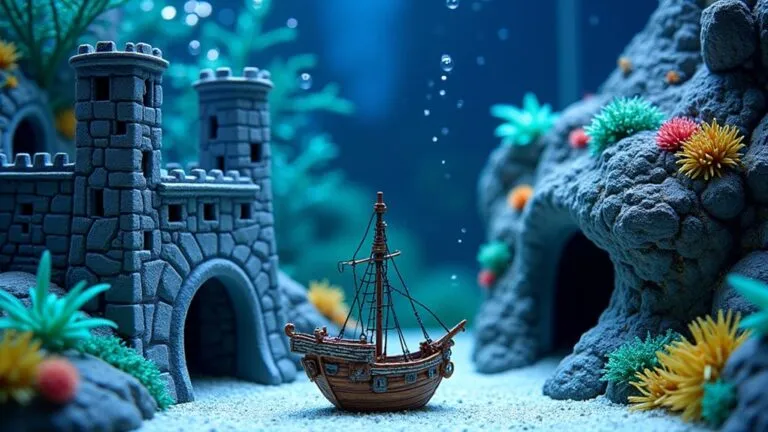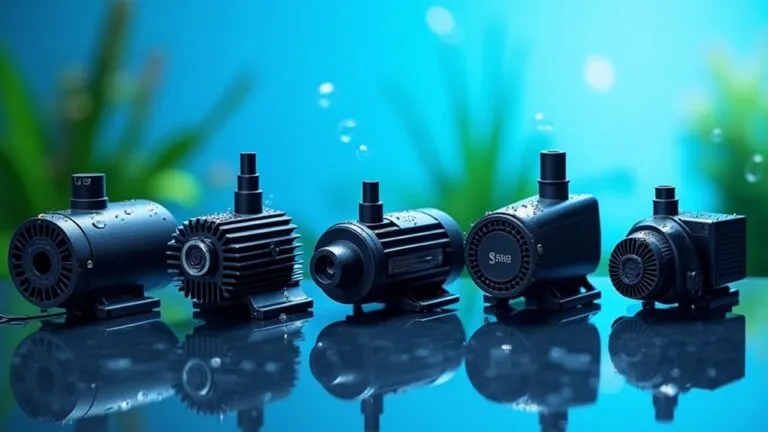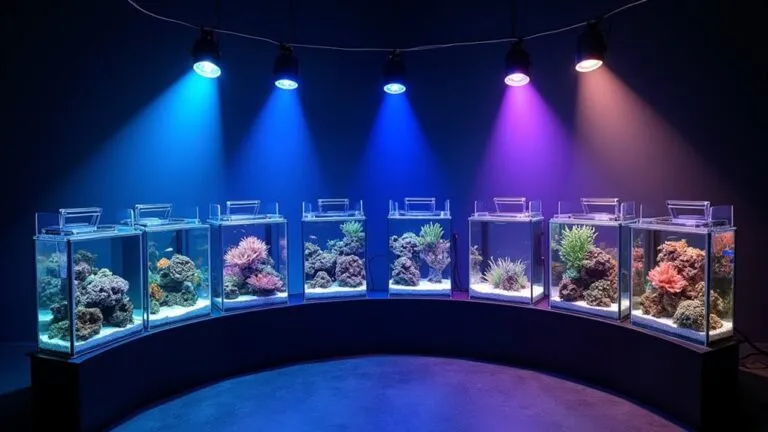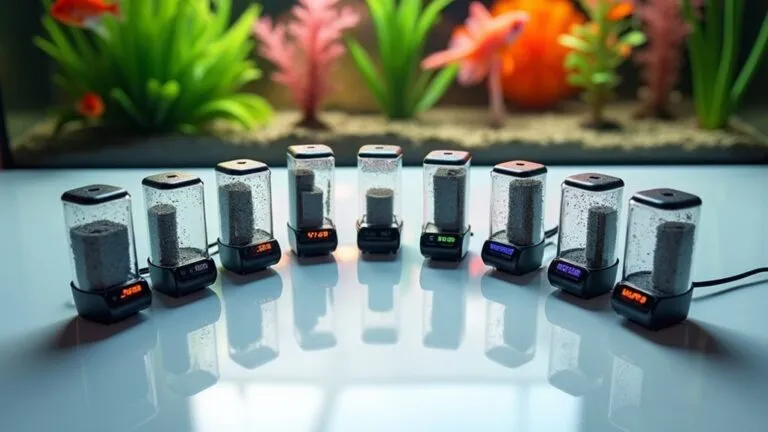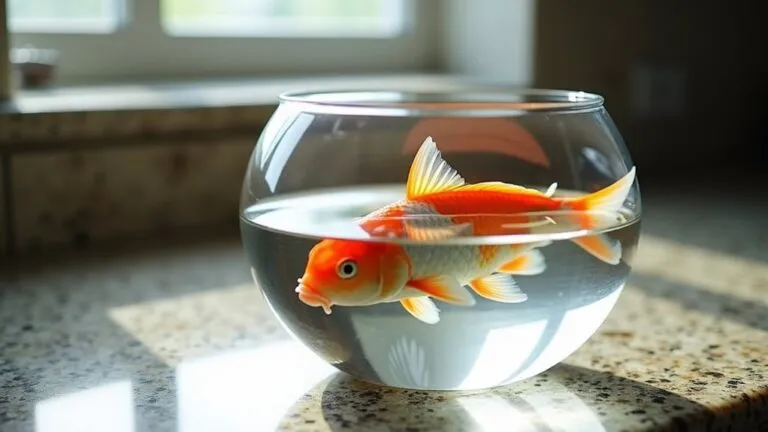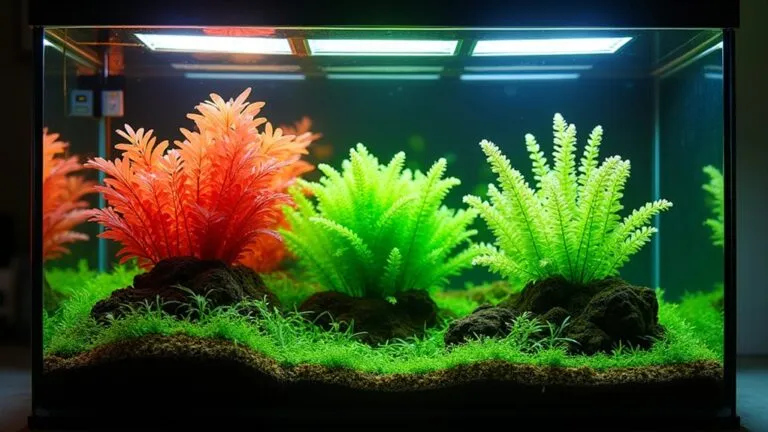When you're choosing a filter for your reef aquarium, think of it as a lifeline for your underwater world. You'll want a combination of options, like protein skimmers to zap away organic waste and sump filters to expand your filtration capacity. Don't forget about media reactors—they're your secret weapon against unwanted nitrates and phosphates! Regular water changes and monitoring water quality are key to keeping your fish and coral thriving. Aim for a turnover rate of 2-3 times your tank's volume an hour. Stick with it, and you'll create a happy home for your aquatic buddies—more insights await!
Contents
Understanding Filtration Systems
When it comes to maintaining a healthy reef aquarium, understanding filtration systems is essential. You want to create a thriving underwater paradise, and that starts with the right setup.
A good filtration system is like the heart of your tank, pumping fresh, clean water while removing waste. These systems typically include mechanical, chemical, and biological filtration to tackle everything from pesky particulates to harmful toxins.
One key player in your filtration system is the protein skimmer. Think of it as your aquarium's superhero, swooping in to eliminate dissolved organic waste before it can turn into nasty nitrates. This keeps your water quality pristine and your marine life happy.
Another helpful tool is a media reactor, which can target specific filtration needs like nitrate and phosphate control. With adjustable flow rates, you can easily match it to your chosen media.
Don't forget, regular water quality testing and maintenance are crucial. It's like going for a check-up; it helps prevent stress and disease in your fish.
Types of Filters for Reef Tanks
Choosing the right type of filter for your reef tank is vital for maintaining a healthy and vibrant ecosystem.
With so many options available, you'll want to focus on what works best for your unique setup. Here are three top filter types to consider:
1. Sump Filters: These are often the go-to choice for reef aquariums. They provide ample space for additional equipment like protein skimmers and use live rock for effective biological filtration.
You'll love the extra room for growth!
2. Protein Skimmers: Think of these as your tank's personal waste collectors. They efficiently remove dissolved organic waste, helping keep your water crystal clear and healthy.
Plus, who doesn't love a cleaner tank?
3. Media Reactors: If you want targeted filtration, media reactors are perfect for controlling specific issues like phosphates or nitrates.
They allow you to customize your filtration needs easily.
With these options in mind, you can create a stable and thriving environment for your reef inhabitants.
Importance of Water Quality
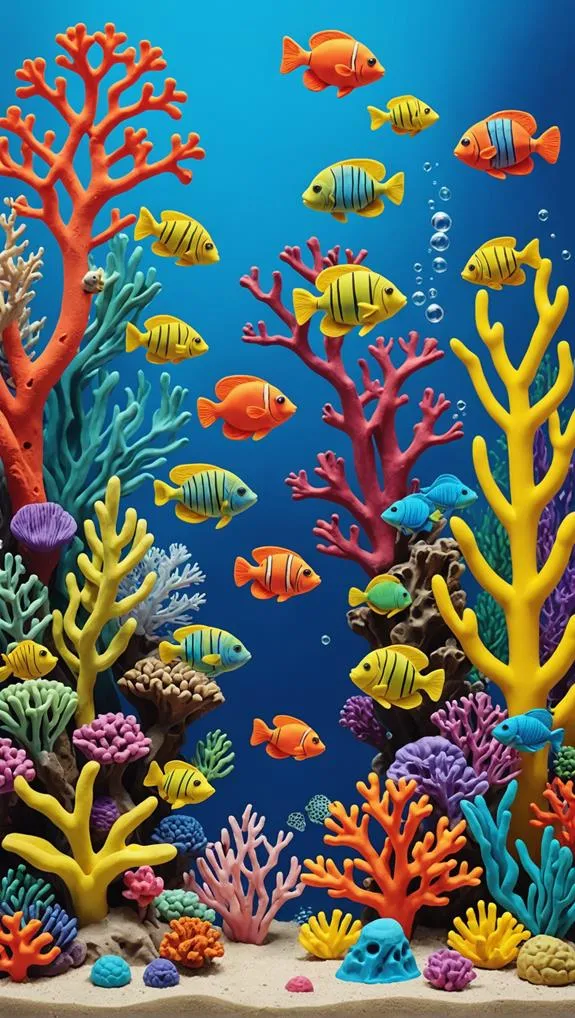
Water quality is super important for your reef aquarium, and it can make or break the health of your marine life. Maintaining stable parameters like pH and temperature is crucial, as fluctuations can lead to stress and health complications for your fish and corals.
If you don't keep an eye on things like ammonia and nitrate levels, you might find your fish and corals feeling more stressed than a cat at a dog show.
Essential water parameters should be monitored regularly to ensure a thriving aquatic environment.
Essential for Marine Life
A thriving reef aquarium is a vibrant ecosystem that relies on high water quality to support its sensitive marine life. Without proper care, your fish and corals can face stress and illness.
To ensure a healthy environment, pay attention to these key factors:
- Filtration Systems: Use efficient systems like sumps with protein skimmers and biological media. They help remove waste and stabilize ammonia and nitrite levels, which can be toxic to your aquatic friends.
- Beneficial Bacteria: These little heroes convert harmful ammonia into less toxic nitrate. Emphasizing biological filtration is crucial for maintaining water quality and keeping your marine life happy.
- Regular Testing: Keep an eye on nitrate and phosphate levels to avoid algal blooms. A balanced ecosystem is essential for the well-being of delicate corals and other organisms.
Preventing Toxic Accumulation
In a reef aquarium, maintaining high water quality is essential for preventing toxic accumulation that can harm sensitive marine life. You mightn't realize it, but compounds like ammonia, nitrite, and nitrate can sneak up on you, just like that one fish that always hides behind the rock. To keep your aquatic friends happy, you'll want to focus on effective biological filtration.
Using live rock and beneficial bacteria helps detoxify waste, turning harmful ammonia into less toxic nitrate.
Don't forget about filter media; it's your first line of defense! Regular water changes—about 10-15% every two weeks—are also a must. This simple step reduces toxic buildup and replenishes vital trace elements that corals need for growth.
And if you want to take it up a notch, consider adding a protein skimmer. It'll whisk away organic waste before it has a chance to decompose, keeping your water quality crystal clear.
Regular Monitoring Practices
Regularly monitoring water parameters is crucial for the health of your reef aquarium.
Think of it as a check-up for your underwater friends. By keeping an eye on your water quality, you can avoid stressing out your marine life.
Here are three key practices to follow:
- Weekly Testing: Use high-quality test kits to check ammonia, nitrite, nitrate, pH, and salinity. This helps you catch any fluctuations before they become problems.
- Regular Water Changes: Aim for partial water changes of 10-15% bi-weekly or monthly. This practice removes contaminants and replenishes essential trace elements, keeping your tank fresh and vibrant.
- Combination Filtration: Implement mechanical, biological, and chemical filtration methods. Together, they enhance water clarity and create a healthy ecosystem for your corals and fish.
Advanced Filtration Techniques
When it comes to maintaining a thriving reef aquarium, employing advanced filtration techniques is crucial for water quality and overall health.
Think of your aquarium as a tiny ocean, where every drop matters. Using protein skimmers is like giving your tank a spa day. These devices create fine bubbles that efficiently remove dissolved organic waste, keeping your water clean and clear.
Sump systems are fantastic for advanced filtration. They let you combine several components, like protein skimmers and media reactors, to create a multi-functional setup.
Media reactors are your best friends for nutrient management. By using specific filtration media, like granulated ferric oxide (GFO), you can keep those pesky phosphates in check, ensuring your reef thrives.
Don't forget about refugiums! They're like little gardens that promote biological filtration. By housing macroalgae, they absorb excess nutrients and provide homes for beneficial organisms.
You can even use fluidized bed filters, which cultivate helpful bacteria to convert harmful nitrates into nitrogen gas.
Best Practices for Filter Maintenance
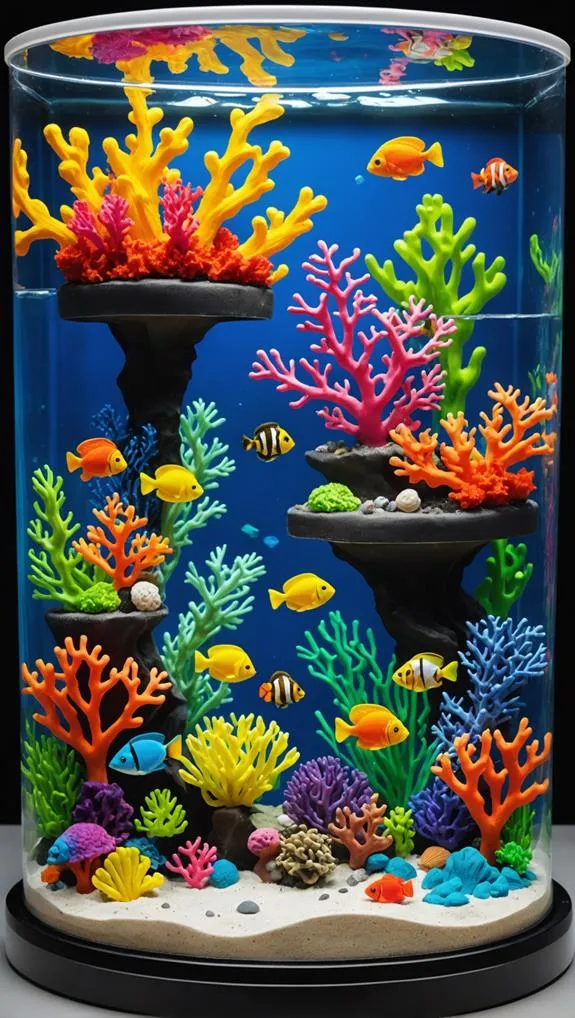
To keep your reef aquarium thriving, filter maintenance is essential for ensuring optimal water quality. By following a few best practices, you can help maintain a healthy environment for your aquatic friends.
Here are three key maintenance tasks to keep in mind:
- Inspect and Clean Filter Media: Regularly check your filter media for clogs. A clogged filter can be a sneaky villain, reducing efficiency and harming water quality.
- Replace Chemical Filter Media: Don't forget to swap out activated carbon and other chemical media every 4-6 weeks. This ensures they effectively absorb impurities and toxins, giving your fish and corals a cleaner home.
- Schedule Routine Water Changes: Aim for bi-weekly water changes of 10-15%. This simple task can dilute nitrates and waste products, supporting overall tank health and making your reef a happier place.
Keep a log of these maintenance tasks to track your efforts and adjust as needed.
Selecting the Right Equipment
Selecting the right equipment for your reef aquarium is crucial for creating a thriving aquatic environment.
First things first, you can't overlook the importance of a good filter. A protein skimmer is a must-have; it helps remove organic waste before it turns into harmful nitrates, keeping your water quality in check.
Plus, consider incorporating a sump system to house additional filtration components like bio-balls, live rock, and even a refugium. This setup enhances the biological filtration capacity of your saltwater aquarium.
Don't forget about media reactors! They're perfect for specific needs, like phosphate control with GFO or for chemical filtration with carbon.
Just remember to adjust the flow rates based on the media type you're using.
Also, ensure your filtration system, whether it's a canister filter or a hang-on-back filter, has a turnover rate of 2-3 times the tank volume per hour for optimal water circulation.
Frequently Asked Questions
What Is the Best Type of Filtration for a Reef Tank?
To achieve the best filtration for your reef tank, you've gotta prioritize protein skimmer importance, implement effective chemical filtration methods, and focus on maintaining water parameters to ensure a healthy environment for your marine life.
How to Select an Aquarium Filter?
When selecting an aquarium filter, consider the filter size for your tank, ensuring it can handle appropriate aquarium flow. Don't forget filter maintenance tips; regular checks keep your aquatic environment thriving and healthy for all inhabitants.
What Is the Best Bio Filter Media for Saltwater Aquarium?
You might think all filter media's the same, but for effective biological filtration, consider ceramic rings, bio-balls, or pumice stones. Regular filter maintenance ensures these media types thrive, keeping your saltwater aquarium healthy and balanced.
Which Filter Is Best for Salt Water?
When choosing a filter for saltwater, prioritize protein skimmer efficiency and strategic filter placement. Regular maintenance ensures optimal performance and water quality, creating a healthy environment for the marine life you care for.
Final Thoughts
Choosing the right filter for your reef aquarium can feel like solving a puzzle, but it's crucial for your underwater friends' health. Did you know that nearly 60% of aquarium problems stem from poor filtration? By understanding your options and keeping up with maintenance, you're setting the stage for a thriving marine ecosystem. So, dive in, explore, and remember: a happy tank makes for a happy you! Your reef will thank you with vibrant colors and lively critters!

